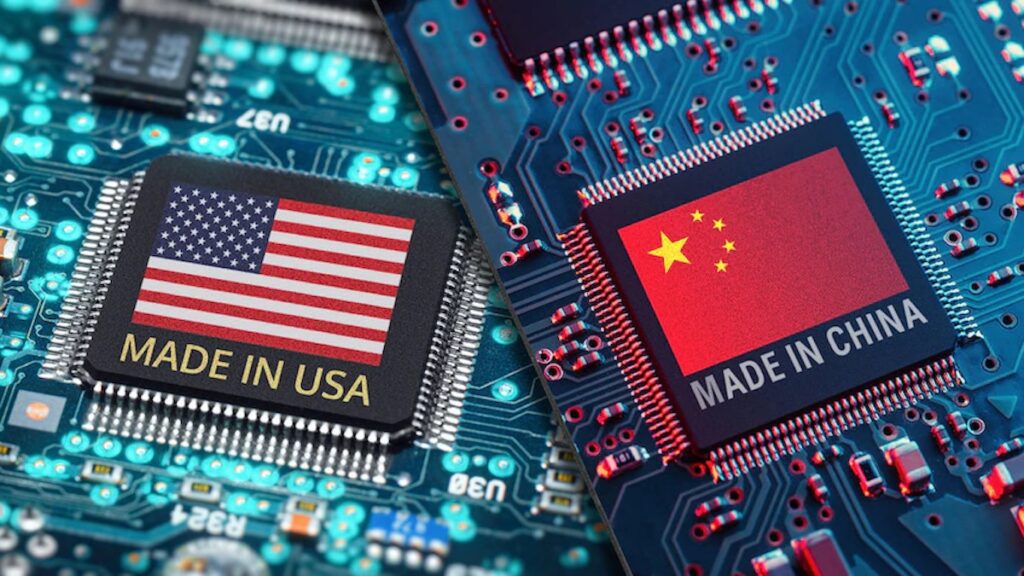|
Getting your Trinity Audio player ready...
|
In a comprehensive set of rules released on Tuesday, the Biden administration, while restricting China’s access to critical U.S. artificial intelligence chips, has quietly extended a potential lifeline to tech giants Nvidia, Intel, and Advanced Micro Devices (AMD) by allowing them to continue supplying AI chips to China for small and medium-sized systems. The move aims to strike a balance between security concerns and maintaining profitable business relationships in one of the world’s largest chip markets.
Deep within the more than 400 pages of regulations, officials from the U.S. Bureau of Industry and Security (BIS) expressed their willingness to collaborate with the semiconductor industry to develop methods to continue supplying AI chips to China for smaller-scale systems. These rules were designed to curb China’s ability to leverage American chips for building massive supercomputers, which could potentially be used for various applications, including military purposes.
According to Thomas Krueger, a former U.S. National Security Council export control official, the primary focus of these rules is to ensure that Chinese military systems do not gain access to capabilities that could pose a security threat. He stated, “The organizing principle for all these rules is to keep them focused on those capabilities that can enable Chinese military systems. They’re not interested in going after broad consumer applications. They’re really trying to thread that needle.”
U.S. officials have solicited input to create a “tamperproof” approach to prevent systems with up to 256 AI chips from being combined to create supercomputers. This approach is aimed at allowing AI training capabilities on a small or medium scale while restricting the development of larger AI models.
Notably, Nvidia, Intel, and AMD have refrained from commenting on these developments. Following the announcement of the new rules, Nvidia’s shares closed down by 4.67% on Tuesday.
In addition to this, these rules also have the effect of hobbling Chinese competitors of Nvidia, Intel, and AMD. It will become nearly impossible for well-funded Chinese startups like Moore Threads and Biren, founded by Nvidia veterans, to have their designs manufactured using cutting-edge chipmaking technology. Consequently, whatever Nvidia can sell to China may represent the best legal option for Chinese buyers.
Analysts at investment bank Piper Sandler expressed their assumption that Nvidia would promptly redesign a chip to align with the new standards, anticipating minimal disruptions to their current business outlook.
The new rules, set to take effect in 30 days, also target China’s chip manufacturers by restricting the export of advanced chipmaking equipment known as immersion deep ultraviolet (DUV) lithography machines containing American parts. These machines are essential in producing chips and other semiconductor components.
While the DUV machines themselves are not manufactured by American toolmakers, Japan’s Nikon and the Netherlands’ ASML are the primary producers. These rules follow previous diplomatic agreements between the U.S., Japan, and the Netherlands to implement controls on sending such machines to China.
The new restrictions, while they may not halt the production of cutting-edge chips, could impact the creation of advanced semiconductors. They are expected to restrain China’s capacity to expand advanced node semiconductor manufacturing in the foreseeable future. Moreover, if spare parts and components for the equipment can be effectively controlled, these regulations may even degrade existing advanced node manufacturing facilities in China.
These rules differ from previous export restrictions as they are more narrowly tailored to target specific technologies and techniques used in complex machines for building advanced transistor designs, as explained by David Kanter, President of Real World Insights. By narrowing the scope of equipment that is subject to restrictions, toolmakers will still be able to sell equipment intended for the production of older chips without contravening government regulations.
The Biden administration’s nuanced approach reflects an effort to safeguard national security interests while preserving important business relationships in the global semiconductor industry. It remains to be seen how these rules will impact the tech industry and the complex balance between technological progress and national security.



